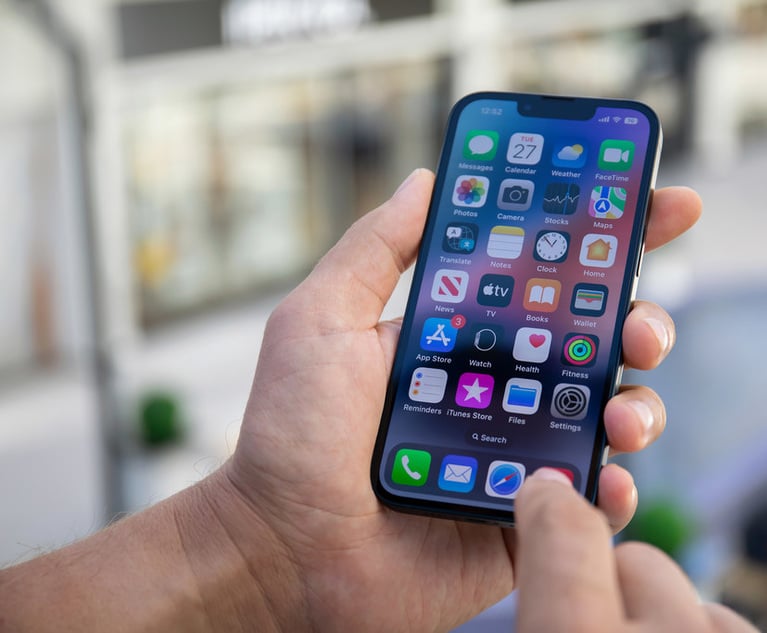Solicitor General Turns Thumbs Down on RPX Bid for Article III Standing
Trade associations and even direct competitors are finding it hard to get standing to appeal adverse judgments from the Patent Trial and Appeal Board.
May 13, 2019 at 07:05 PM
5 minute read
 Judge Richard Taranto of the U.S. Court of Appeals for the Federal Circuit, during U.S. Circuit Judge for the District of Columbia Circuit Sri Srinivasan's official Investiture ceremony. Sept.r 26, 2013. Photo: Diego M. Radzinschi/NLJ
Judge Richard Taranto of the U.S. Court of Appeals for the Federal Circuit, during U.S. Circuit Judge for the District of Columbia Circuit Sri Srinivasan's official Investiture ceremony. Sept.r 26, 2013. Photo: Diego M. Radzinschi/NLJ The odds of companies such as RPX Corp. and Askeladden LLC ever having standing to appeal Patent Trial and Appeal Board decisions just got longer.
It's even becoming a challenge for industry competitors, if they haven't sued each other.
The solicitor general's office on Thursday sided with patent owners who argue that, although Congress gave anyone the right to petition for review of patent validity, only those who can demonstrate Article III injury have standing to appeal in court.
The SG's amicus brief makes it less likely—though certainly not impossible—that the Supreme Court will hear defensive patent aggregator RPX's challenge to the Federal Circuit's refusal to hear its appeal in RPX Corp. v. ChanBond.
The Federal Circuit, meanwhile, continues to tighten up standing, ruling Monday that being a competitor in the same industry does not necessarily confer constitutional standing. AVX Corp.'s fear that Presidio Components Inc. might have a reasonable basis for asserting its patent “does not mean that there is any reasonable basis right now,” Judge Richard Taranto wrote for a unanimous panel.
The America Invents Act, the 2011 statute that reconstituted the PTAB and its role in post-grant patent reviews, states that “a party dissatisfied with a final written decision” of the PTAB may appeal it.
But the Federal Circuit ruled in 2014 that Congress didn't have the power to confer Article III standing, which requires a concrete injury. That's left member-supported groups like RPX or Unified Patents with no recourse after a loss at the PTAB.
RPX argued to the Federal Circuit that its loss to ChanBond LLC at the PTAB was its first in 17 petitions for inter partes review that went to final written decision.
Backed by Ravicher Law Firm and Klarquist Sparkman, RPX argued to the Supreme Court last fall that its reputation has suffered injury and it's been further harmed by the statutory estoppel that precludes it from challenging the patent again at the PTAB.
After banking trade group Askeladden and the New York Intellectual Property Law Association contributed amicus support, the Supreme Court called for the solicitor general's views.
The SG said Thursday that the Federal Circuit has it right.
Even when Congress has unambiguously authorized a particular class of plaintiffs to seek judicial relief, “Article III standing requires a concrete injury,” states the SG's amicus. The Supreme Court should construe “any party dissatisfied” may appeal as “any party aggrieved by” or “injured by” to avoid constitutional problems, the SG argues.
RPX got dinged by the Federal Circuit last year over allegations—still being litigated—that it did the bidding of one of its members at the PTAB. Before the Supreme Court it has emphasized that it is “the sole real party-in-interest in this proceeding” and hasn't communicated with any client about the preparation or filing of its ChanBond case.
But that's cut against standing. “For all that appears in the record,” the SG brief states, “petitioner is a stranger to the [ChanBond] patent and the invention it claims. Petitioner therefore concedes that it cannot show 'a patent-inflicted injury in fact.'”
George Washington University law professor Dmitry Karshtedt said RPX appears to have a tough road ahead.
“Perhaps RPX will shift gears in the supplemental brief, but without a claim of associational standing, it may have a tough time undermining the CAFC's (and now SG's) conclusion,” he said.
Even competitors in the same industry are facing similar challenges.
AVX describes itself as an international supplier of “a wide range of capacitors which are used all across the electronics industries.” Presidio is a direct competitor; the two have been involved in four lawsuits in the last decade.
AVX tried to invalidate Presidio patent claims at the PTAB but failed. If that ruling stands, Presidio will essentially be handed a limited monopoly in part of their market. The Federal Circuit has presumed injury when a federal agency action benefits one competitor over another, AVX's Foley & Lardner attorneys argued.
Taranto reasoned in AVX v. Presidio Components that the competitive harm theory requires a more direct effect on competition, such as by opening a market to new competitors. DuPont recently met that standard in a PTAB case, where it had opened a plant that was ready to manufacture products that arguably infringed a competitor's patent.
But “AVX has not pointed to a capacitor in any stage of development that might implicate the upheld claims of [Presidio's] patent,” Taranto wrote. “We conclude that AVX has identified no harm to it, competitive or otherwise, resulting from the Board's decision.”
Gregory Ahrens of Wood Herron & Evans had the winning argument for Presidio Components.
But there was a silver lining for AVX, and maybe for RPX too. Without a final judgment on appeal, petitioners may not be precluded from re-litigating their arguments at the PTAB or in district court, Taranto suggested.
Judges Pauline Newman and Kathleen O'Malley concurred in the opinion.
This content has been archived. It is available through our partners, LexisNexis® and Bloomberg Law.
To view this content, please continue to their sites.
Not a Lexis Subscriber?
Subscribe Now
Not a Bloomberg Law Subscriber?
Subscribe Now
NOT FOR REPRINT
© 2025 ALM Global, LLC, All Rights Reserved. Request academic re-use from www.copyright.com. All other uses, submit a request to [email protected]. For more information visit Asset & Logo Licensing.
You Might Like
View All
Apple Battles Multiple Antitrust Class Actions After Being Sued by DOJ

Google Hit With Consumer Class Action Claiming Pixel Pro 6 Smartphone Has Overheating Defect


King & Spalding Attorney Tells Congress Strong Rules Enforcement Is Needed to Curb China's IP Practices
Trending Stories
Who Got The Work
J. Brugh Lower of Gibbons has entered an appearance for industrial equipment supplier Devco Corporation in a pending trademark infringement lawsuit. The suit, accusing the defendant of selling knock-off Graco products, was filed Dec. 18 in New Jersey District Court by Rivkin Radler on behalf of Graco Inc. and Graco Minnesota. The case, assigned to U.S. District Judge Zahid N. Quraishi, is 3:24-cv-11294, Graco Inc. et al v. Devco Corporation.
Who Got The Work
Rebecca Maller-Stein and Kent A. Yalowitz of Arnold & Porter Kaye Scholer have entered their appearances for Hanaco Venture Capital and its executives, Lior Prosor and David Frankel, in a pending securities lawsuit. The action, filed on Dec. 24 in New York Southern District Court by Zell, Aron & Co. on behalf of Goldeneye Advisors, accuses the defendants of negligently and fraudulently managing the plaintiff's $1 million investment. The case, assigned to U.S. District Judge Vernon S. Broderick, is 1:24-cv-09918, Goldeneye Advisors, LLC v. Hanaco Venture Capital, Ltd. et al.
Who Got The Work
Attorneys from A&O Shearman has stepped in as defense counsel for Toronto-Dominion Bank and other defendants in a pending securities class action. The suit, filed Dec. 11 in New York Southern District Court by Bleichmar Fonti & Auld, accuses the defendants of concealing the bank's 'pervasive' deficiencies in regards to its compliance with the Bank Secrecy Act and the quality of its anti-money laundering controls. The case, assigned to U.S. District Judge Arun Subramanian, is 1:24-cv-09445, Gonzalez v. The Toronto-Dominion Bank et al.
Who Got The Work
Crown Castle International, a Pennsylvania company providing shared communications infrastructure, has turned to Luke D. Wolf of Gordon Rees Scully Mansukhani to fend off a pending breach-of-contract lawsuit. The court action, filed Nov. 25 in Michigan Eastern District Court by Hooper Hathaway PC on behalf of The Town Residences LLC, accuses Crown Castle of failing to transfer approximately $30,000 in utility payments from T-Mobile in breach of a roof-top lease and assignment agreement. The case, assigned to U.S. District Judge Susan K. Declercq, is 2:24-cv-13131, The Town Residences LLC v. T-Mobile US, Inc. et al.
Who Got The Work
Wilfred P. Coronato and Daniel M. Schwartz of McCarter & English have stepped in as defense counsel to Electrolux Home Products Inc. in a pending product liability lawsuit. The court action, filed Nov. 26 in New York Eastern District Court by Poulos Lopiccolo PC and Nagel Rice LLP on behalf of David Stern, alleges that the defendant's refrigerators’ drawers and shelving repeatedly break and fall apart within months after purchase. The case, assigned to U.S. District Judge Joan M. Azrack, is 2:24-cv-08204, Stern v. Electrolux Home Products, Inc.
Featured Firms
Law Offices of Gary Martin Hays & Associates, P.C.
(470) 294-1674
Law Offices of Mark E. Salomone
(857) 444-6468
Smith & Hassler
(713) 739-1250








